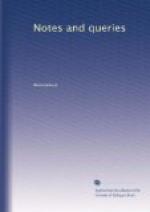“Louer les princes des
vertus qu’ils n’ont pas, c’est leur
dire impunement des injures.”—La
Rochefoucauld, Max. 327.
I believe that Pope marks it as a translation—a borrowed thought—not as a quotation. He has just before used the words “your Majesty;” and I think the word “scandal” is employed “consulto,” and alludes to the offence known in English law as “scandalum magnatum.” Your correspondent will, of course, read the work in the original; in fact, he must do so per force. A good translation of Les Maximes is still a desideratum in English literature. I have not yet seen one that could lay claim even to the meagre title of mediocrity; although I have spared neither time nor pains in the search. Should any of your readers have been more fortunate, I shall feel obliged by their referring me to it.
MELANION.
Endeavour.—I have just found the following instance of “endeavour” used as an active verb, in Dryden’s translation of Maimbourg’s History of the League, 1684.
“On the one side the majestique House of Bourbon,... and on the other side, that of two eminent families which endeavour’d their own advancement by its destruction; the one is already debas’d to the lowest degree, and the other almost reduc’d to nothing.”—p. 3.
C. FORBES.
Temple.
* * * * *
MISCELLANIES.
Epigram by La Monnoye.—It has been ingeniously said, that “Life is an epigram, of which death is the point.” Alas for human nature! good points are rare; and no wonder, according to this wicked, but witty,
EPIGRAM BY LA MONNOYE.
The world of fools has such a store,
That he who would not see
an ass,
Must bide at home, and bolt his door,
And break his looking glass.
S.W.S.
Mickleham, Dec. 10. 1849.
Spur Money.—Two or three years since, a party of sappers and miners was stationed at Peterborough, engaged in the trigonometrical survey, when the officer entered the cathedral with his spurs on, and was immediately beset by the choristers, who demanded money of him for treading the sacred floor with armed heels. Does any one know the origin of this singular custom? I inquired of some of the dignitaries of the Cathedral, but they were not aware even of its existence. The boys, however, have more tenacious memories, at least where their interest is concerned; but we must not look to them for the origin of a {374} custom which appears to have long existed. In the Memorials of John Ray, published by the Ray Society, p. 131., there is the following entry in his second Itinerary:—
“July the 26th, 1661, we began our journey northwards from Cambridge, and that day, passing through Huntingdon and Stilton, we rode as far as Peterborough twenty-five miles. There I first heard the Cathedral service. The choristers made us pay money for coming into the choir with our spurs on.”
East Winch.




